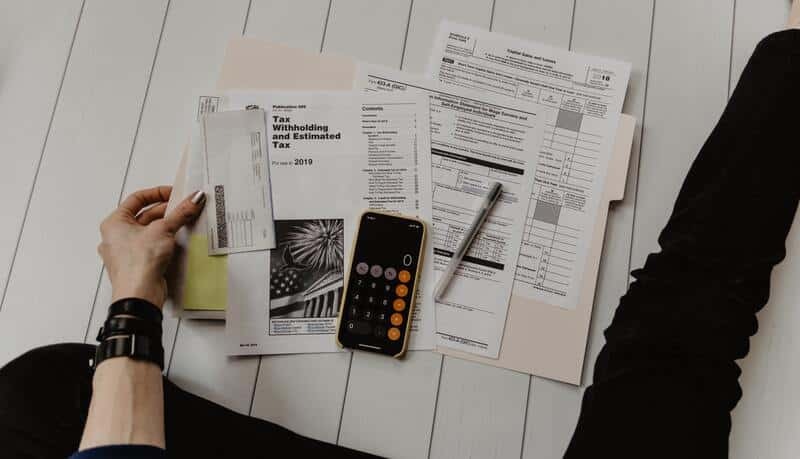If you are planning to start a business or work in Vietnam this year, clearly understanding the Vietnam income tax system is important. The Vietnamese government has implemented several changes to the tax code in recent years, and it can be difficult to navigate the system without the proper guidance.
This guide will provide you with a comprehensive overview of the Vietnam income tax system, including information on tax rates, deductions, and compliance requirements.
We will cover everything you need to know to ensure that you comply with the law and take advantage of all available deductions and credits.
So, if you want to be fully prepared to navigate Vietnam’s income tax system in 2023 and beyond, read on to learn all you need to know.
If you want to invest as an expat or high-net-worth individual, which is what I specialize in, you can email me (advice@adamfayed.com) or use WhatsApp (+44-7393-450-837).
This article isn’t tax advice and the facts might have changed since we wrote it.
Table of Contents
What is the current state of the tax system in Vietnam?
Vietnam income tax system is based on a progressive tax rate, where taxpayers are taxed at different rates based on their income level.
The tax year in Vietnam runs from January 1 to December 31. Taxable income includes salary income, business income, and rental income.
Taxable income is determined by subtracting deductions and exemptions from gross income. Deductions and exemptions include education expenses, health expenses, and charitable donations.
The government sets the tax rate and tax brackets each year, which are subject to change.
Complying with Vietnam income tax laws is important for both individuals and businesses. Failing to file or pay taxes can result in fines, penalties, and even criminal charges.
It is also important for taxpayers to understand the tax laws and regulations to take advantage of deductions and exemptions and minimize their tax liability.

What is taxable income, its types, and its deductions?
In Vietnam, taxable income is defined as the total income received by an individual or a business during a tax year minus deductions and exemptions.
Several types of income are subject to tax in Vietnam. First is the salary income, which refers to the money received from employment, such as wages, salaries, bonuses, and other compensation.
Another type of taxable income is business income: This includes income received from operating a business, including profits from self-employment or from owning a company.
Meanwhile, rental income is taxable income received from renting out a property, such as a house or apartment.
Vietnam also charges taxes for capital gains. This income is received from selling assets such as stocks, bonds, and real estate.
Regarding deductions and exemptions, Vietnam allows reduced tax charges for education expenses such as tuition, textbooks, and school supplies.
The country also allows taxpayers to deduct charges to expenses related to health care, such as medical treatments and prescription drugs.
Another way to get deductions from Vietnam income tax is through charitable donations made to eligible organizations.
There are also deductions for other expenses, such as business-related travel, business-related equipment, and home office expenses.
For exemptions, some types of income, such as certain types of investment income or certain types of foreign income, get a special exemption from Vietnam income tax.
What are the tax rate and tax brackets in Vietnam?
Vietnam income tax system is based on a progressive tax rate, meaning that taxpayers are taxed at different rates based on their income level.
The progressive tax rate for salary income in Vietnam ranges from 5% to 35%, with different tax brackets and corresponding tax rates.
This is generally considered relatively high compared to other Southeast Asian countries.
For example, Singapore has a flat tax rate of 22%, and Indonesia has a progressive tax rate ranging from 5% to 30%.
However, Vietnam does offer a number of deductions and exemptions to reduce taxable income, which can help to lower the overall tax burden for taxpayers.
The government sets the tax brackets and corresponding tax rates each year, which are subject to change. However, generally, the tax brackets and corresponding tax rates for salary income in Vietnam for the year 2023 are as follows:
- 5% for income up to 9 million VND
- 10% for income between 9 million VND and 18 million VND
- 15% for income between 18 million VND and 32 million VND
- 20% for income between 32 million VND and 52 million VND
- 25% for income between 52 million VND and 80 million VND
- 30% for income between 80 million VND and 120 million VND
- 35% for income over 120 million VND

How to file and pay income tax in Vietnam?
The deadline for filing and paying taxes in Vietnam is typically in April or May of the following year. The deadline for filing income tax returns for the year 2023 is May 20, 2023.
The specific forms and documentation required for filing taxes will vary depending on the type of income, but generally, individuals will be required to provide documentation.
This includes salary, rental income statements, and proof of deductions and exemptions. Businesses must also provide financial statements and other documentation, such as invoices and receipts.
In Vietnam, failing to file taxes or pay taxes on time can result in penalties and fines. The specific penalties will depend on the nature of the non-compliance and the severity of the case.
For example, failing to file taxes on time may result in fines, while failing to pay taxes may result in additional interest charges. In more severe cases, non-compliance can result in criminal charges.
It’s important to be aware of the tax laws and regulations in Vietnam, file taxes, and pay taxes on time to avoid penalties and fines. If you have any questions or concerns about tax laws and regulations, it’s always best to consult with a tax professional or government agency.
What is the taxation rule for foreign income in Vietnam?
In Vietnam, foreign income is subject to tax if a Vietnamese resident receives it or if it is received by a non-resident who has a permanent establishment in Vietnam.
A Vietnamese resident is defined as an individual living in Vietnam for 183 days or more in a tax year or has a place of residence in Vietnam.
A permanent establishment is defined as a fixed place of business through which an individual or a business carries on its activities, for example, a branch, a factory, an office, or a mine.
Foreign income subject to tax in Vietnam includes income from employment or self-employment outside of Vietnam, renting out property outside of Vietnam, capital investments outside of Vietnam, and other sources such as dividends, interest, and royalties.
To avoid double taxation, Vietnam has also signed treaties with several countries that outline how foreign income is taxed in Vietnam.
Under these treaties, foreign income may be taxed at a reduced rate or may be exempt from tax in Vietnam if it is already being taxed in the country of origin.
What is the taxation rule for self-employed individuals and small businesses in Vietnam?
In general, if you operate a business in Vietnam, the tax rate for business income is 20%. However, small and medium-sized enterprises may be eligible for a reduced tax rate of 17%.
Self-employed individuals and small businesses are also required to register with the local tax office and file income tax returns on a yearly basis.
To support their tax returns, they must also keep accurate records of their income and expenses, including invoices and receipts.
Self-employed individuals and small businesses may also be eligible for certain deductions and exemptions to reduce their taxable income.
For example, they can deduct expenses such as office rent, equipment, and travel expenses. They can also deduct any contributions to social insurance and health insurance schemes.

What is the taxation rule for capital gains in Vietnam?
Capital gains are defined as the profit realized from the sale of an asset such as stocks, bonds, real estate, and other investments.
When calculating the capital gain, the asset’s cost, including any expenses incurred in acquiring the asset, can be subtracted from the asset’s selling price. This results in a net capital gain which is subject to tax.
It’s important for individuals and businesses to keep accurate records of their capital gains and to report them as part of their taxable income.
They should also be aware of any deductions or exemptions available to reduce their tax liability on capital gains.
What are the common pitfalls in following the Vietnam income tax?
There are several common pitfalls to avoid when navigating the income tax system in Vietnam.
One of the most important is failing to accurately report income and deductions, which can lead to penalties and fines. It is also important to stay informed about changes to tax laws and regulations, as these can significantly impact how much tax is owed.
Another pitfall is not keeping proper records, which can make it difficult to file taxes accurately and may lead to audits or other penalties.
To stay up-to-date on the latest changes to the income tax system in Vietnam, it is a good idea to consult the official government regularly
websites, such as the General Department of Taxation website.
Additionally, consulting with a tax professional or accountant can be helpful in understanding and complying with tax laws and regulations.
Also, it’s worth noting that Vietnam has signed tax treaties with many countries to avoid double taxation, so it’s important to know how these agreements can help and how they can affect your tax liability.
Conclusion
In conclusion, understanding and complying with Vietnam’s income tax laws is important for individuals and businesses.
The tax system in Vietnam is based on a progressive tax rate, where taxpayers are taxed at different rates based on their income level. Taxable income includes salary, business, and rental income, and deductions and exemptions are available to reduce the taxable income.
It’s essential to be aware of the tax deadlines for filing and paying taxes in Vietnam and to have the necessary forms and documentation ready. Non-compliance with tax laws can result in penalties and fines.
Foreign income is subject to tax in Vietnam, and tax treaties with other countries can help to avoid double taxation. Self-employed individuals and small businesses are also subject to income tax on their business income, and they may be eligible for deductions and exemptions. Capital gains are also subject to tax as part of an individual’s or a business’s taxable income.
Understanding and complying with Vietnam’s income tax laws ensure compliance with local laws and regulations, which is essential for maintaining a good reputation and avoiding legal penalties.
It also ensures that individuals and businesses are paying their fair share of taxes, which helps to support government services and infrastructure.
It can also help individuals and businesses better plan their finances and make informed decisions about their income.
However, it is always important to stay updated on any changes to the tax laws and regulations in Vietnam and to consult with a tax professional or government agency to understand the specific tax laws that apply to you or your business.
Pained by financial indecision? Want to invest with Adam?

Adam is an internationally recognised author on financial matters, with over 760.2 million answer views on Quora.com, a widely sold book on Amazon, and a contributor on Forbes.



